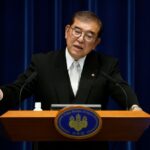Multiple media outlets, including Politico and Reuters, reported on the 27th that the Trump administration has instructed U.S. embassies and consulates worldwide to suspend in-person visa interviews for foreign students and exchange scholars. Citing a State Department cable, the reports also say the administration is considering requiring all international students applying to study in the U.S. to undergo social media screening. This move is seen as another major tightening of policies on international students, following last week’s decision to revoke Harvard University’s ability to enroll foreign students. It has sparked a fresh wave of outrage both domestically and internationally.
Bloomberg described the policy as potentially “disastrous, even devastating” for international students and the U.S. universities that rely on them. The American higher education community has pushed back, stating: “International students are not a threat to this country — they are an invaluable asset.”
In response, prestigious institutions such as the Hong Kong University of Science and Technology and the University of Tokyo have extended invitations to students affected by the U.S. policy. At a press conference on the 28th, Chinese Foreign Ministry spokesperson Mao Ning said that China has always believed normal educational and academic exchanges should not be disrupted. She urged the U.S. to genuinely safeguard the legitimate rights and interests of all international students, including those from China.
“Effective Immediately” – Visa Interviews Canceled
According to Politico, the first to report the news, a cable signed by Secretary of State Rubio on the 27th states that the U.S. State Department plans to soon issue updated guidelines on social media screening for foreign students and exchange visitors applying for visas. The cable instructs all U.S. embassies and consulates to “cancel related visa interview appointments effective immediately.” Existing appointments may proceed under current rules, but no new interviews should be scheduled. As for how long the suspension will last, the cable says it will remain in effect “until we issue further guidance in the coming days.”
The cable does not specify what kind of social media content might disqualify a visa applicant. It simply states that U.S. officials will closely examine applicants’ statements “regarding the United States, the current administration, and its policies.” The move is described as a way to prevent “terrorists” and combat “antisemitism.” Reports note that U.S. officials have previously warned that some student visa and green card holders who expressed support for Palestine or criticized Israel could be deported, labeling such actions as a “threat to U.S. foreign policy.”
The U.S. State Department has neither confirmed nor denied the report. According to the Associated Press, when asked about the suspension of student visa interviews, State Department spokesperson Bruce declined to comment directly on the reports during a press briefing on the 27th. However, she stated that the suspension was a temporary measure. “We take the vetting process for every entrant very seriously and will continue to do so,” she said. “Every sovereign nation has the right to know who is entering, why, who they are, what they’ve done, and reasonably predict what they’ll do while here. This is nothing new.” Bruce also emphasized, “We will continue to use every tool to screen individuals coming to the U.S., whether they’re students or not.”
France’s Le Monde: This is the latest in a series of Trump administration actions targeting international students—following the revocation of thousands of legal statuses and the attempt to bar Harvard from enrolling any non-U.S. students. That attempt was blocked by a federal judge. Since taking office on January 20, the Trump administration has used a little-known law to revoke the visas of thousands of foreign students for activities deemed “contrary to U.S. foreign policy.” While some regained their status through lawsuits, many left the country out of fear. Now, the U.S. is doubling down on efforts to terminate international students’ legal presence.
The latest restrictions have drawn sharp criticism from the U.S. academic community. On the 27th, NAFSA: Association of International Educators issued a statement warning that suspending visa interviews could impact not just this fall’s enrollment but also admissions for years to come. The statement condemned the policy as unfair to international students.
A “Disaster for U.S. Science and Innovation”
“The Trump administration is escalating its war on elite universities,” wrote Bloomberg, describing the latest move to restrict foreign students from entering top U.S. universities under the pretext that they pose “national security threats” or promote “antisemitism.” What began as a clash over pro-Palestinian protests at institutions like Harvard and Columbia has now evolved into a broader assault on U.S. higher education.
According to Fox News on the 27th, Leo Terrell, a senior legal advisor at the U.S. Department of Justice, announced the government would launch large-scale lawsuits targeting antisemitism at the University of California system and other schools across the East Coast, West Coast, and Midwest. Terrell leads a multi-agency task force on combating antisemitism.
American media warn that these measures could deal a severe blow to the country’s higher education system. The Associated Press noted that suspending visa interviews and halting visa issuance could delay student enrollment and deter international students from studying in the U.S. Many universities, which rely heavily on international tuition to close budget gaps, could suffer major financial consequences.
The Washington Post reported that over a million international students enroll in U.S. universities each year, generating tens of billions of dollars in economic activity and contributing significantly to the tech sector. According to a year-end report by NAFSA: Association of International Educators, international students at U.S. institutions numbered over 1.12 million in the 2023–2024 academic year, contributing $43.8 billion to the U.S. economy and supporting more than 378,000 jobs.
In response to growing criticism over the crackdown on elite universities and international students, White House spokesperson Lavitt defended the Trump administration’s stance on a televised program, saying taxpayer dollars should prioritize vocational and state schools. “America needs more electricians and plumbers,” she said, “not Harvard graduate students studying LGBTQ theory.”
However, Vox warned that this policy shift could spell “a disaster for American science and innovation.” The report noted that some foreign governments are already funding programs to attract U.S. researchers harmed by Trump-era science budget cuts. If international students stop coming to the U.S., it could severely undermine the country’s global leadership in science and technology.
The Nikkei Asian Review, citing several American scholars, echoed this concern. Experts warned that such policies not only damage U.S. higher education but also erode the country’s ability to attract top global talent and stay ahead in innovation. Jason, a professor at the University of Michigan, asked bluntly: “These actions are an attack on the entire U.S. industry. Who will tech giants hire? How will America stay ahead in innovation?”
Global Welcome for Students Unable to Stay in the U.S.
Reactions to the U.S. policy shift have varied around the world. According to Reuters, the move has sparked concern among South Korean students and their families. South Korea has the third-largest population of international students in the U.S. Due to intense competition at top Korean universities, many students pursue education abroad. One Korean student currently studying in the U.S. said some of his friends are now unable to book visa interviews, and he’s worried about his own plans to work in the U.S. after graduation: “I feel like the U.S. now is very different from the one I used to know.”
The Financial Times reported that from January to April this year, the number of international students preparing to study in the U.S. dropped by 50%. If this trend continues, demand to study in the U.S. could fall by 70% by the end of 2025. Many prospective students are now turning their attention to alternatives like Europe and Australia.
Top universities in various countries are actively trying to attract students and professionals who can no longer study or work in the U.S. The Hong Kong University of Science and Technology was among the first to act, issuing open invitations to international students currently enrolled or admitted to Harvard. The university pledged unconditional admission, priority processing for applications and credit transfers, and established a dedicated support team to assist with housing, visas, and other logistics.
Japan’s University of Tokyo announced on the 27th that it would temporarily accept international students who can no longer continue their studies at Harvard, offering them a chance to complete their education. A spokesperson from Kyoto University said they are considering hosting early-career researchers from U.S. universities.
Hong Kong Chief Executive John Lee recently stated that Hong Kong welcomes any students facing discrimination or academic barriers in the U.S. due to government policy. Japan’s Minister of Education, Culture, Sports, Science and Technology, Toshiko Abe, said on the 27th that she had asked Japanese universities to consider accepting international students affected by U.S. policy changes.
According to The Times (UK) on the 28th, former Culture Secretary Smith, who is currently running for Chancellor of the University of Cambridge, called the U.S. restrictions a “once-in-a-lifetime opportunity” for Britain to attract the world’s brightest minds.
The Nikkei Asian Review noted that Southeast Asian countries like Indonesia and Vietnam, whose roles in the global tech supply chain are rapidly growing, are also poised to benefit from the shift. These nations face rising demand for high-skilled talent. “We see this as an opportunity. We warmly welcome people to Indonesia,” said Pandu, Chief Investment Officer of Indonesia’s newly established sovereign wealth fund, at a recent job fair in Los Angeles.













Leave a comment